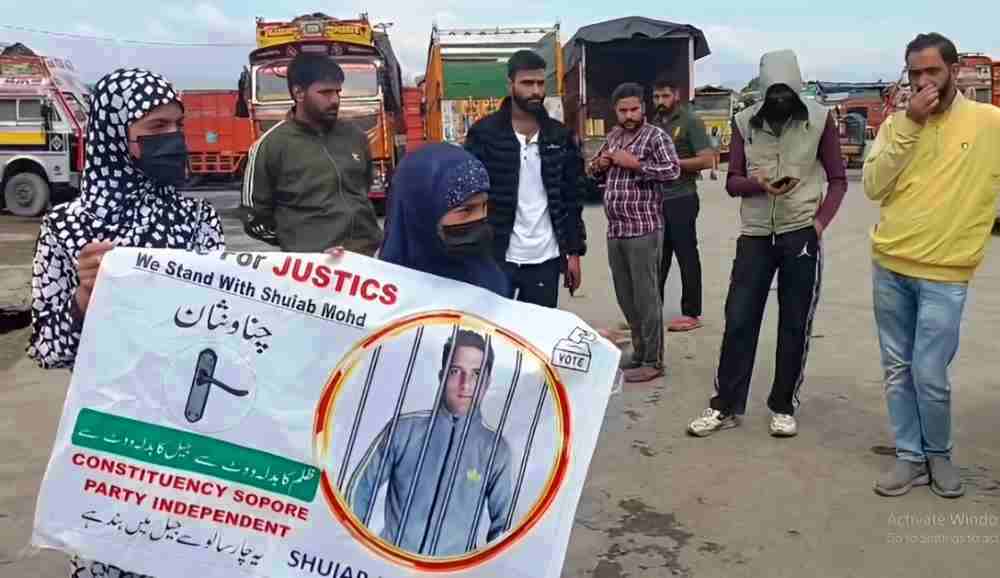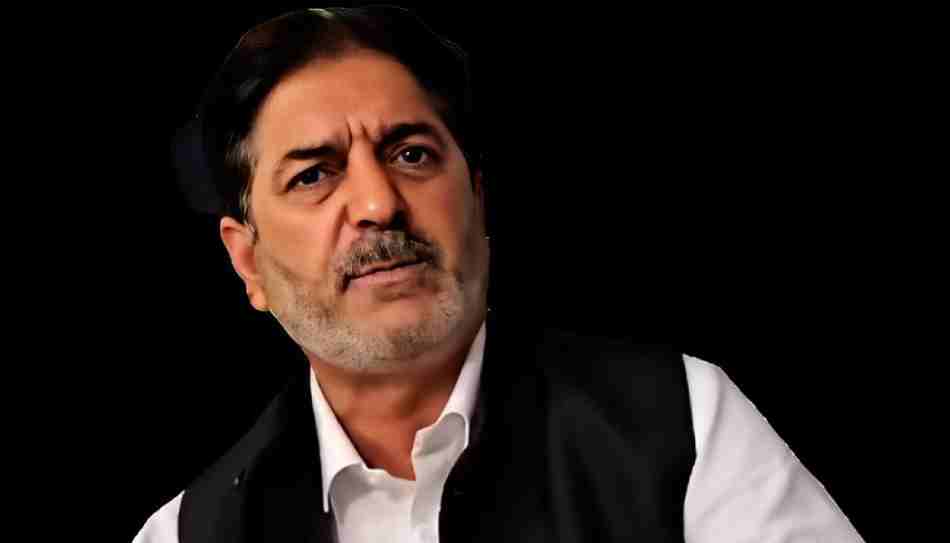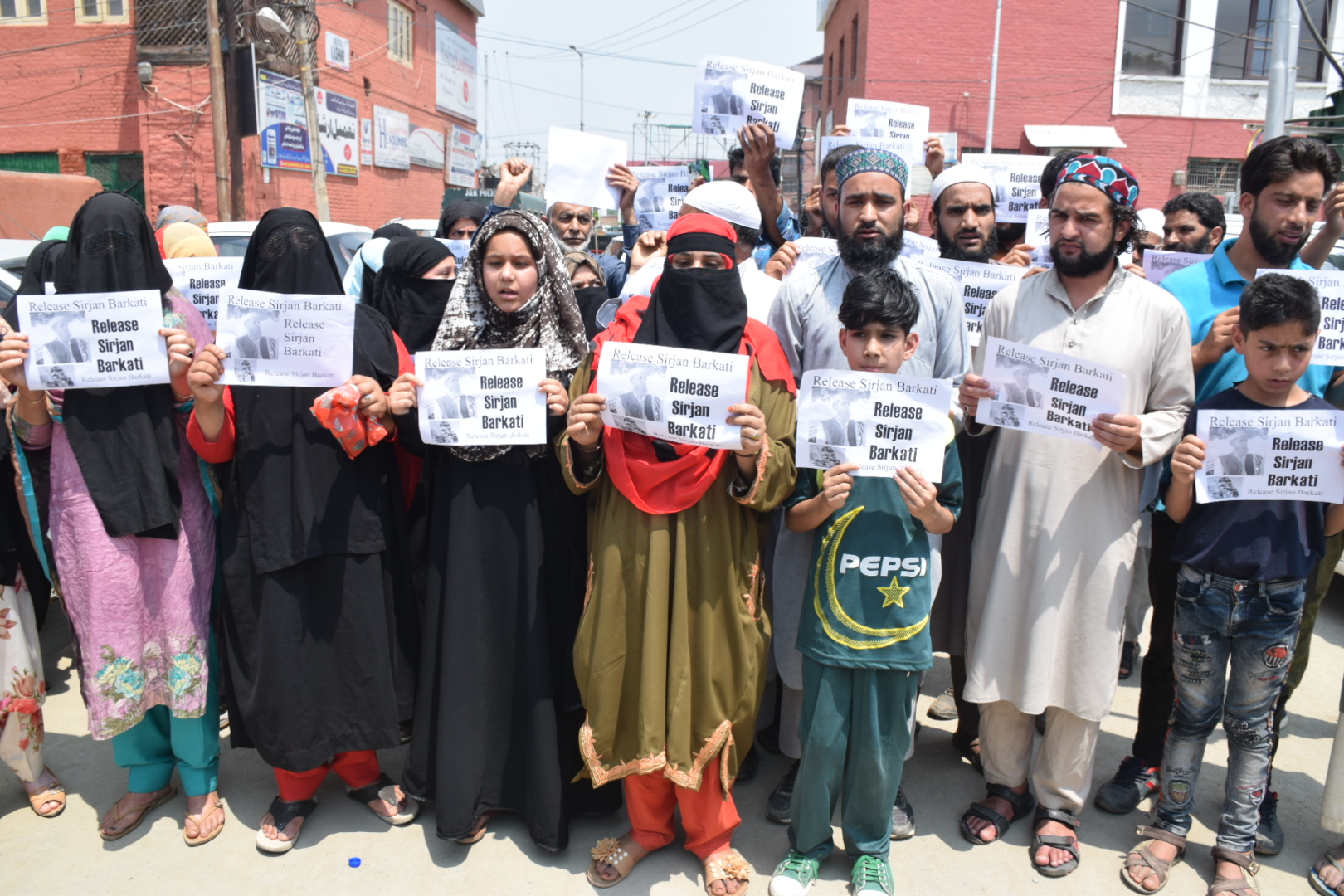The successful campaign that Engineer Rashid’s son launched to make their father a member of the Lok Sabha emerged as a trend in the assembly elections being held for the first time after 10 years, reports Humaira Nabi
On August 27, 2024, under the gloomy overcast sky, a group of men assembled outside the district headquarters of Shopian. A young woman, clad in a burka with only her eyes visible and her hands covered, emerged from a vehicle. Amidst chants of Barkati Fouj hai aav (The army of Barkati has descended), Sugra Barkati, daughter of the jailed cleric and known separatist Sarjan Barkati, swiftly made her way through the crowd to file nomination papers for the Zainapora constituency in the Assembly elections on behalf of her father.
Sarjan, along with his wife Shabroza Bano are in jail after their arrest by the State Investigation Agency (SIA) in August and November 2023 respectively. He is accused of “orchestrating an extensive crowd-funding campaign that allegedly generated crores in funds, which were subsequently misused, involving money laundering and the acquisition of undisclosed assets to propagate radicalism within the Kashmir Valley.”
A long-time separatist worker, his candidacy raised many eyebrows, in Kashmir and beyond. The event catapulted on social media, with people sharing mixed reactions. While some viewed it as a positive move, many questioned the apparent shift in separatist’s beliefs.
A day later on August 28, however, Sarjan’s nomination papers were rejected as it “lacked an oath certificate.” It hardly impacted Sugra’s resolve to make her father an aspirant for the Jammu Kashmir assembly membership.
On September 5, Sugra drove to Ganderbal and Budgam to file nominations for the Ganderbal and Beerwah Assembly constituencies. This was followed by her emotionally charged speeches in Beerwah (avoiding Ganderbal), who climbed onto vehicles to cry, wail sing, recite the Quran, and rally support for votes. Her cause was clear- to secure her father’s release from jail, a standard set by sons of Engineer Rasheed’s sons.
“My father hasn’t been proven guilty, Sugra told people. “I long with my younger brother have been living as orphans. Please help me bring them home by voting for my father, who has sacrificed his family for his nation.”
With passionate chants of Jail manz ha naere nabar, shaer babar shaer babar (He’ll come out of jail, lion lion) and jail ka badla vote sai (revenge for jail through vote), she called for solidarity, highlighting her father’s status as a mazloom qaidi (oppressed prisoner).
Inspired by witnessing the impact of Engineer Rashid’s sons in the parliamentary elections, who spearheaded the campaign for their jailed father, Sugra motivated her father to file nomination papers, believing that a win might get her parents released from jail.
Jails In Focus
Jails and incarcerations have long been central to Kashmir’s turbulent history. While the region is undergoing assembly elections after a decade, the issue of incarceration has once again taken centre stage. Political parties across the region are cantering their campaigns around their own experiences of imprisonment, as well as the widespread detention of youths. The theme of jails and incarceration has emerged as a powerful rallying cry—one so overwhelming that it looks unprecedented.
Several candidates contesting in the region are turning their jail terms post-2019 as a ‘qualification’ in election campaigning. Independent candidates and parties are running campaigns under the slogan Jail Ka Jawab Vote Se (Revenge for jail through votes), making jail one of the vital parts of the conversation of the current political discourse in the region.
The Slogan
The slogan Jail Ka Badla Vote Sai first gained prominence after Waheed Parra, the PDP Youth Wing President, was released following 19 months of imprisonment. He was arrested in November 2020 by the NIA under the Unlawful Activities (Prevention) Act, accused of alleged “involvement in terrorism”, shortly after filing his nomination for the District Development Council (DDC) elections in Jammu and Kashmir. Despite his detention, Parra won the DDC elections from his hometown of Pulwama in December 2020.
In the lead-up to the recently held parliamentary elections, Parra’s supporters championed the slogan as he ran for the Srinagar parliamentary constituency. Throughout his campaign, Waheed focused on the promise of fighting for a “jail-free and cases-free” Kashmir, while sharing his own experiences of how it feels to be in Jail.
“I understand the plight of the incarcerated youth in Kashmir,” Parra would tell in election rallies. “There is a need to make their pain heard at the national level.”
PDP insiders assert that the issue of jailed being raised by Parra and other was not for gaining sympathy. “Unfortunately, certain parties or candidates have used this issue as a sentimental tool instead of addressing the genuine concerns,” Party spokesman Mohit Bhan said. “When our youth president Waheed Parra or the parliamentary candidate introduced the slogan jail ka badla vote se, it was to counter the Government of India’s narrative that they could silence the political or democratic voices of Jammu and Kashmir by using jails. We wanted to send a message that, despite being silenced, we will continue to use democratic means, like voting, to make our voices heard.”
In contrast, the Awami Itihad Party (AIP) effectively used the same narrative to their advantage. Its founder Engineer Rashid’s two sons succeeded in striking a deep emotional chord with the public, rallying support for their jailed father.
“Your vote can prove pivotal in the release of my father, whom I haven’t seen for the last five years,” Abrar, Rashid’s elder son stated in an emotionally charged speech. “My elderly grandfather and grandmother are eagerly waiting for their son, who has been suffering because he was raising the issues of the people.”

His message resonated powerfully across Kashmir, with people even walking barefoot to attend their rallies. The campaign ultimately led to a major victory when Rashid defeated former Chief Minister Omar Abdullah by over one lakh votes. Although Rashid’s win didn’t immediately result in his release, he was recently granted interim bail by the Patiala House Court in Delhi to campaign for his party in the upcoming Assembly elections.
After spending over five years in Tihar Jail, Rashid was welcomed by supporters amidst chants of Tihar ka badla vote se. Since his release, Rashid has been vocal about his experiences in jail and has been advocating for the release of Kashmiri prisoners.
Rashid also shared stories of Kashmiri prisoners, who have been facing medical negligence in jails outside Kashmir, shedding light on the dire conditions many Kashmiri prisoners face, including the denial of parole, even when close family members pass away. He also highlighted the situation of women prisoners, referring to them as our Sitas, and urged authorities to transfer these women to prisons in Kashmir. He questioned why there is no space for them in Kashmir jails.
“While the slogan of Jail ka badla vote se was initially started by Para, it was then gradually picked up by other parties too as a symbolic gesture of how Kashmiris have been kept in a state of constant surveillance since 2019,” a close observer of Kashmir politics said. “Er Rashid had just come out of jail while Sarjan Barkati continues to be in jail, so it’s natural for the masses to connect them more with the slogan of Jail ka badla vote se in comparison to Waheed, given that he had come out on bail two years back.”

The Others
In North Kashmir’s Sopore constituency, a significant candidacy has added quantity to the jail narrative in the current assembly elections-Ajaz Ahmed Guru, brother of Afzal Guru, who was convicted for the Parliament attack and executed in 2013. Ajaz is contesting the elections for the sake of his son, Shoaib Aijaz Guru, 26, who was arrested in 2023 under the Narcotic Drugs and Psychotropic Substances (NDPS) Act, 1985, and is currently detained under the Public Safety Act (PSA) at Central Jail, Jammu. Ajaz’s motivation to run for the assembly elections arises from his belief that his son is imprisoned unjustly. “I will advocate for those who have been wrongfully arrested, including my son,”
A few kilometres away from Ajaz Guru another jail-induced independent candidate is in the fray. Shuiab Mohammad Sheikh, 39, is a resident of Tujjar Sharief. He was arrested in 2021 and is now contesting elections from jail. He faces charges under the Unlawful Activities (Prevention) Amendment Act, 2008, for working as an overground worker (OGW) of the Al-Badr militant outfit.
Party Manifestos
The discourse was translated in the regional party manifestos for the current assembly elections as they have pledged to address the pressing issue. The JKNC in its manifesto has promised to release those detained following the August 5 decision and vows to end “arbitrary detentions” under the widely criticised Public Safety Act (PSA).
The PDP is advocating for a political solution to the region’s problems and the revocation of laws that facilitate “unjust arrests”. “We will strive for the revocation of PSA, UAPA, and Enemy Act to put an end to the unjust arrests of political and social activists, journalists, civil society members, and concerned citizens,” the manifesto reads.
The AIP in its manifesto has promised unconditional release of all political prisoners languishing in jails. Besides, the party would utilise its efforts to revoke laws like the PSA and UAPA.
Janata Dal (United), a key ally of the BJP-led NDA government, has committed to releasing stone pelters and political prisoners. “We will review cases and facilitate the release of political prisoners and stone pelters to promote peace and reconciliation,” the JD(U) manifesto states.
Prisoners
In the second phase of the assembly elections, eight constituencies (31 per cent) were classified as ‘red alert’ constituencies, where three or more candidates had declared criminal cases against themselves. According to a report by the Association for Democratic Reforms (ADR), 49 out of 238 candidates (21 percent), who contested in Phase II had declared criminal cases. Among them, 37 candidates (16 per cent) were facing serious charges, including three accused of attempted murder under IPC Section 307. Additionally, seven candidates were involved in crimes against women, with one facing rape charges under IPC Section 376.
Party-wise, the Bharatiya Janata Party (BJP) saw four out of 17 candidates (24 per cent) with criminal cases, of which three (18 per cent) had serious charges. The Indian National Congress (INC) had two out of six candidates (33 per cent) with criminal cases, both facing serious charges. PDP had four out of 26 candidates (15 per cent) with criminal cases, including one (4 per cent) facing serious charges. NC had one out of 20 candidates (5 per cent) with a criminal case, and this candidate faced a serious charge.

A report by the Polis Project reveals that, as of August 2023, 408 individuals detained under the Public Safety Act (PSA) are being held in jails outside Jammu and Kashmir, according to a document from the region’s Home Department. The PSA grants authorities the power to detain citizens for up to two years without trial or formal charges, enabling arrest and detention without a warrant or specific charges, often leading to extended confinement without a clear time limit.
Since 2018, 1122 individuals subjected to the PSA have been relocated to prisons beyond Jammu and Kashmir – 44 in 2018, 295 in 2019, 146 in 2021, 585 in 2022, and 52 as of 1 August 2023. This relocation began after the then Governor NN Vohra eliminated Section 10 of the PSA, which had prevented authorities from moving detainees to jails outside the former state. Although the amendment faced opposition in the Supreme Court, the Kashmir administration defended their decision, citing security reasons and the need to prevent the mingling of “hardcore” insurgents with other prisoners.
The Social Workers
When Engineer Rashid’s sons launched their election campaign, they had two bearded companions by their side—one a Sikh, the other a Muslim. It was like a scene straight out of Amar Akbar Anthony movie except, amusingly, this time there was no Hindu or Christian in the mix. Yet, it somehow managed to convey a semblance of secularism.
The Sikh, Angad Singh, and the Muslim, Adil Nazir, identify themselves as social workers, dedicated to the mission of “uplifting human lives in the region.” After helping Rashid’s sons win by supporting him, they were seen again, this time accompanying Sugra Barkati as she filed nomination papers for her father in Zainapora, Ganderbal, and Beerwah.
“Both families are close to me, and my colleagues and I encouraged them to participate in the elections,” Adil said. “As for Sarjan, I told the family it was the only way forward. What better way to shake off the anti-national tag than by jumping into the democratic process? Sure, there are FIRs against him, but elections fix everything, right?”
“We just want people to understand the importance of elections in a democracy and how separatism is not the solution,” Adil added.


